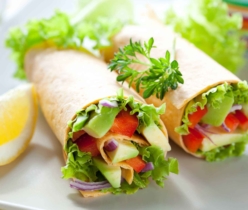Pcod is a hormonal disorder causing enlarged ovaries with small cysts on the outer edges and produces excessive amounts of androgen and estrogenic hormones. This excess, along with the absence of ovulation, may cause infertility.
Symptoms
Acne
Weight gain and trouble losing weight.
Extra hair on the face and body. Often women get thicker and darker facial hair and more hair on the chest, belly, and back.
Thinning hair on the scalp.
Irregular periods. Often women with PCOS have fewer than nine periods a year. Some women have no periods. Others have very heavy bleeding.
Fertility problems. Many women who have PCOS have trouble getting pregnant (infertility).
Depression.
Regular exercise, healthy foods, and weight control are the key treatments for PCOS.
Treatment can reduce unpleasant symptoms and help prevent long-term health problems.
Researches show that including protein-rich food like (chicken, egg, fish, pulses, soy products), a complex carbohydrate which will add fiber, including good fat helps in managing pcod.
Benefits of Soy for Women with PCOS:
1. Reduction in Total and LDL cholesterol
2. Reduction in Insulin
3. Reduction in inflammatory markers
4. Reduced oxidative stress
5. Reduction in testosterone
6. Consuming moderate amounts (a few servings a week) of traditionally prepared, unprocessed soy may offer health benefits to women with PCOS who do not have thyroid disorders. These benefits include reductions in LDL cholesterol and triglycerides and possible reductions in insulin resistance. Soy may also provide protection against oxidative damage in women with PCOS.
Women with PCOS who are trying to conceive may find that moderate intakes of soy could improve their fertility.
Foods to AVOID
High GI (Glycaemic Index) Foods:
Foods that have a high GI result in a quick rise in blood sugar levels. Insulin levels follow suit to deal with the glucose in the bloodstream. Generally, high GI foods have been processed to remove fiber and other nutrients so they may be tasty but they are high in calories while lacking in nutrients.
Some examples of high GI foods to avoid: white rice, mashed potatoes, rice cakes, muffins, and cakes.
Dairy:
Milk
Milk leads to a rise in testosterone levels. It contains a protein that limits normal testosterone processing in the body. With testosterone not being managed, testosterone levels just keep rising. As our testosterone levels are already prone to being high, dairy just makes the problem worse.
Bad Fats:
Saturated, hydrogenated and trans fats are all fats that should be avoided. Saturated fats, found in red meat and dairy products, cause an increase in estrogen production, hinder the absorption of some nutrients and can cause weight gain.
The trans and hydrogenated fats, from cooking oil, margarine, and processed foods, increase your risk of heart disease and diabetes, both of which we are already at risk of as a result of our PCOS.
So, cut down on red meat and get rid of the dairy, Also, avoid those processed, fatty foods.
Foods to INCLUDE:
Green Leafy Vegetables:
Green, leafy vegetables have the most nutrients per calorie than any other food. They are rich in iron, calcium, potassium, and magnesium, as well as vitamins K, C, E, and many of the B vitamins.
Vitamin B, in particular, plays a vital role in managing PCOS symptoms. It is responsible for: sugar and fat metabolism, thyroid function and hormone balance, amongst others. It plays a vital role in the management of PCOS.
Fruit:
fruit for pcosFruit is a rich source of fiber, vitamins, minerals, and phytonutrients and should be enjoyed as part of a PCOS diet. Many women with PCOS are reluctant to eat fruit or avoid fruit as it can cause a spike in blood sugar levels and therefore insulin.
However, fruit still plays an important role in providing the nutrients we need to combat PCOS. So, try to eat fruit that has a lower GI and have a handful of seeds or nuts with your fruit as protein helps to regulate the sugar spike resulting from fruit.
Fruit with a low GI value include cherries, plums, grapefruits, apples, pears, apples, dried apricots, grapes, coconut, coconut milk, kiwi fruit, orange juice, prunes.
Coloured and White Vegetables
Brightly colored vegetables are a rich source of antioxidants and should be included in a PCOS diet. Women with PCOS have been found to have a higher rate of oxidative stress. That is, physiological stress is placed on the body when dealing with high numbers of free-radicals. We need antioxidants to combat this oxidative stress.
Healthy Fats:
Avocado For PCOS Not all fat is bad and healthy fats are essential for your PCOS diet.
Essential fatty acids are really important for maintaining the cell wall, which allows nutrients in, and toxins out. They are also vital for hormone balance, weight management, and fertility.
These healthy fats are found in nuts and seeds, oily fish, avocado and olive oil so be sure to incorporate those into your diet.
Detoxification
the process of removing toxic substances.
performing regular body cleanses and detoxes are a core principle of my beliefs on health and healing.
Some signs of toxic overload include:
Constipation
Bloating
Gas
Headaches
Fatigue
Aches and pains
Nausea
Belly Fat
Skin problems
Food cravings
Low energy
Bad breath
Mood swings
Its lowers the body’s metabolic rate
Detox recipe
Classic Cucumber Water Ingredients:
Cucumbers contain a lot of health benefits, including vitamins, flavonoids, and other healthy compounds that fight inflammation, protect your brain health, and even freshens your breath.
medium cucumber, cleaned, peeled (or unpeeled depending on your preference) and cut into 1/2 inch slices.
Watermelon and Strawberry Mint Detox Water
Not only does watermelon taste delicious, but it also has a lot of great health benefits including it helps lower blood pressure, improved insulin response and alleviate muscle soreness.
Strawberries are filled with wonderful antioxidants, making this drink a nutritional powerhouse.
Watermelon and Strawberry Mint Detox Water Ingredients:
4 cups watermelon in /2-inch cubes, lightly mashed
1/2 pint strawberries, sliced in half
6 sprigs mint (lightly crushed)


